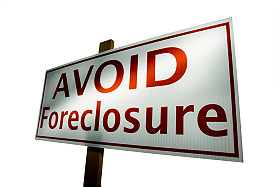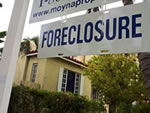Mortgage Info for borrowers with bad credit
Bad Credit Mortgages
Foreclosure: Avoid Losing Your Home
by Amy Lillard
Buying a home and assuming a mortgage payment is a risk.
It's a calculated risk. Owning property offers many rewards – family happiness and satisfaction, credit score attractiveness, and more. But if you fail to meet your end of the bargain in a mortgage by missing payments, the risk is great. 
Foreclosure is the process that begins if you default on your mortgage loan, and can result in the loss of your home. It can adversely affect your future credit, and cause havoc for your family.
So how do you avoid foreclosure? First – plan ahead. Save enough to cover several months of housing costs in case of unexpected emergencies, such as job loss, divorce or separation, serious illness, or the death of a family member.
If you are facing an upcoming mortgage payment that you can't pay, don't avoid the situation or let deadlines pass silently. Instead, call your mortgage company as soon as you realize you won't be able to pay. Talk about the circumstances with your lender. Many people wait to call the mortgage company until several missed payments have gone by. Earlier calls mean more options to stall foreclosure; later calls means a greater chance of losing your home.
Depending on your situation, the mortgage company may be able to offer some temporary financial relief. Increasingly, companies want to help solve potential foreclosures. Full foreclosures can cost lenders thousands of dollars and massive time spent in legal proceedings. It makes much more sense financially to help a borrower who has only missed one or two payments rather than get mired in foreclosure processes.
A number of alternatives exist to stall or stop foreclosure:
- Forbearance. This is an agreement to temporarily let you pay a smaller mortgage payment or no mortgage payment during a set period. Companies are especially keen on this option if you can show funds from a bonus, tax refund or other source will be coming soon to help reinstate normal payments.
- Reinstatement. Often occurring with forbearance, a reinstatement is when you pay the mortgage company the total amount you are behind by a specific date.
- Repayment Plan. This option allows you to repay the amount you are behind by combining a portion of the past due amount with regular monthly payments. This is established over a fixed amount of time to ensure you gradually pay back the defaulted amount.
- Loan Modification. For those that can't afford repayment plans, the mortgage company may be willing to consider a permanent change to the loan terms to make payments more affordable. Loan modifications can include extending the life of the loan, adding missed payments to the existing loan balance, and making an adjustable-rate mortgage a fixed-rate mortgage.
In more serious cases of financial stress where you can no longer afford to keep your home, but wish to avoid the negative effect of foreclosure on your credit, companies may offer other alternatives. The lender can help a borrower get rid of the house through a pre-foreclosure sale, or through a “deed in lieu of foreclosure” agreement, in which the property deed is surrendered to the lender.
Refinance at Today's Low Rates!If all else fails, other options exist as well. Filing for bankruptcy can halt the foreclosure process and force the mortgage lender to accept a more borrower-friendly repayment plan. Additionally, private loans can give borrowers extra options, but should be considered carefully in terms of high-interest rates and fees.
Visit the nations #1 site for foreclosures and find homes for half the price.
Learn more about foreclosure types, foreclosure problem, straw buyers, how to invest in foreclosed properties, and more in our continuing series
Foreclosures Rise, Congressman Calls for Moratorium
Foreclosure Rate Continues to Climb
FHA Changes Mean Better Option for Many Homeowners
Fannie Mae & Jumbo Mortgage Rates
Just One Click! = Current Rate Chart


